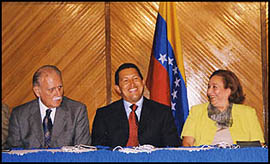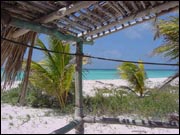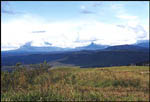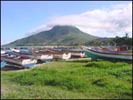 Tourism
- The Future Backbone of Venezuela? Tourism
- The Future Backbone of Venezuela?
In 1997 the growth of the Venezuelan tourist industry appeared unstoppable as the attraction of tropical beaches and rainforests spurred a boom in investments and in the flow of visitors. The Venezuelan Tourist Board, Corpoturismo reported that the industry earned $1.1 billion in 1997 an increase of 17% versus 1996. Then the political uncertainties of a presidential election hit in 1998 followed by a serious slow down in the economy and a crushing recession in 1999. Just when tour operators and hotel owners thought the sector would see a renaissance, mudslides in coastal Vargas state struck. Images of once golden beaches covered in dirt and debris made a deep impression in the minds of international tourists, even though the disaster only effected an insignificant percentage of Venezuela's 2,616 kilometers of Caribbean coastline. On the holiday island of Margarita, hotel owners complained of 50% occupancy throughout 2000, while many hotels were closed indefinitely.
Recognizing the natural advantages that Venezuela
has, from towering tabletop mountains to coral reefs
and crystalline seas, the government has set out
to rescue Venezuela's tourism sector from its current
low. In a first symbolic step the promotion of tourism
is now consecrated in the newly approved constitution.
"For the first time in the history of Venezuelan
tourism it s being given the importance it deserves,"
says Enrique
Luis Fuentes , the president of Operaciones
Mercantiles ELF, a major Venezuelan hotel construction
and tourism company. "Petroleum only generates 42,000
jobs, while 300,000 tourists can generate jobs for
270,000 people."

Already in place is the Tourism law approved in
1998 which regulates all tourism activity and includes
tax incentives such as fiscal credit on new investments,
excluding land; exemption on the Corporate Assets
Tax (IAE); and customs tariff exemption for ships,
airplanes, and hotel equipment. Venezuela's Production
and Commerce minister Luisa Romero Bermudez
says that the government will imminently unveil
and integrated plan for national tourism specifically
in major tourism areas like Margarita Island. "If
we work at it we estimate that we can have over
three million tourists per year arriving from abroad
from the current total of 700,000," says Guillermo
Velutini , president of Venezuela's
tourism chamber .
"Margarita has a number of characteristics that
are the main foundation for the development of investments
in tourism on a local and international basis,"
says Velutini. Margarita's endless sandy beaches,
fabulous sunsets, and fantastic seafood cuisine
are seen as the essential ingredients for attracting
tourists. Yet corruption, problems in marketing
the island internationally, and a lack of political
will have helped the island sink into a malaise.
One area where Margarita could develop its tourism
strengths is in the cruise industry, industry insiders
say. Folco
Riccio Frojo, the executive president of Puerto
la Mar , a cruise ship development hopes to
change all this with a multi-million dollar project
on the waterfront of Margarita's capital Porlamar.
"In Margarita we receive around 200,000 foreign
visitors a year by air, and around 100,000 through
the port. We believe that in five years we can attract
over 600,000 tourists," says Riccio. Construction
of state of the art docking facilities is currently
underway while bars and shops are also being built.
"Puerto la Mar will be one of the only ports in
the Caribbean that can receive 3 large cruise ships
at the same time. The cruise ships have now doubled
in size, and not many ports in the Caribbean are
ready to receive them," he adds. |
Creative solutions are the key to the future success of Margarita, according to Fanny Cohen daughter of Salomon Cohen, President of Constructora Sambil , and president of the Venezuelan Inversiones Hoteleras group that owns the luxury Hotel Centro Lido in Caracas and several state of the art shopping centers across the country including one soon-to-be-opened in Margarita. Cohen says that the group is currently thinking of organizing facilities for patients recovering from operations or plastic surgery in Margarita. "Margarita is an island which offers a variety of attractions," she adds. "Not just beaches but mountain climbing casinos, and a beautiful shopping center."

In the rest of Venezuela, business and local government is also waking up to the positive economic effects of the tourist dollar. With outstanding biological and ecological diversity, eco-tourism is now being actively marketed among hikers, birdwatchers and adventure travelers. Eco-tourism is seen as a sustainable way of opening up Venezuela's 16 national parks. Home to towering sand dunes and salt marshes home to flock of rare ibis and flamingos as well as lush tropical rainforests north western Falcon state is just such a place. "We want balanced and sustainable development," says Jesus Montilla the governor of Falcon state , currently fine-tuning the state's tourism model. "We don't want a fragile eco-system like ours negatively impacted by the development of tourism." Coro, the capital of Falcon, is Venezuela's oldest colonial town, and has been named by the United Nations as a site of special cultural and historical interest, one aspect that tour operators will be looking to capitalize in on the future. "We want to exploit the very distinct architecture that we have a mix of Dutch and Caribbean as well as our local cuisine," says Maria Pimentel de Palm , the president of Corpotulipa , a government foundation dedicated to the promotion of investment, specifically tourism in the area. Already in place as an incentive for investors is the Free Ports law passed in 1991, which applies to much of Falcon. Investors in the free port zone of Falcon’s Paraguana peninsula can receive a ten-year exoneration from income tax on all profits from goods produced for export. The government can extend such benefits for up to 10 years. All raw materials that are destined for processing and re-export are allowed to be imported duty free. In addition the zone offers the free export of goods abroad.

Government investments in training local people in the tourism service industry are one of the ideas that the state is currently promoting. One regularly heard tourist complaint is that Venezuelans lack the skills and understanding of what American and European tourists expect when on holiday. "In the short term we believe that we can have a population trained within five years, in ten years we will have all the basic services." Pimentel says.

Western Merida state , where the mighty Andes begin its dramatic journey to southern Peru, is a popular spot for trekkers and climbers. To encourage greater tourism, local government is sitting down with hotel owners, trekking companies and local craftsman to establish a coherent plan of what the state has to offer. "Tourism will increase," says the Governor of Merida state Florencio Porras . "We are going to establish points for tourists to get good information, as well as fund artisan markets and create an indigenous art route through the state." |

